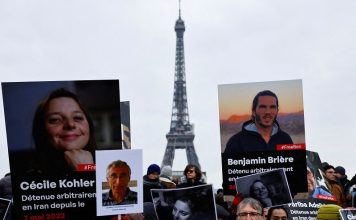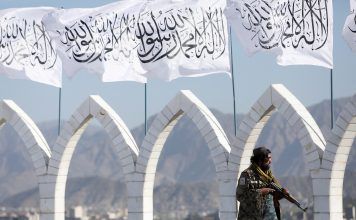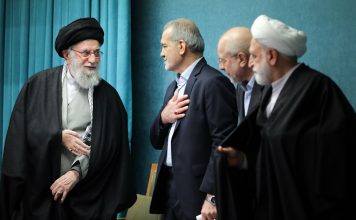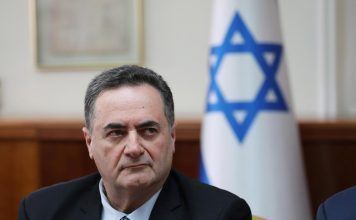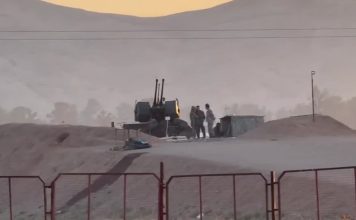By Arshad Mohammed and Humeyra Pamuk
WASHINGTON, Sept 21 (Reuters) – The United States on Monday slapped new sanctions on Iran’s defense ministry and others involved in its nuclear and weapons program to support the U.S. assertion that all U.N. sanctions against Tehran are now restored, which key European allies as well as Russia and China reject.
Iran said the new U.S. sanctions, which targeted 27 Iranian entities and people in the nuclear, missile and conventional arms sectors, would have no effect and accused the United States of seeking publicity.
The latest sanctions on the oil-exporting nation include a new executive order signed by President Donald Trump targeting those who buy or sell Iran conventional arms that was previously reported by Reuters.
U.S. Secretary of State Mike Pompeo told reporters Washington had put new sanctions on Venezuelan President Nicolas Maduro under the order, accusing Iran and Venezuela of having worked “to flout the U.N. arms embargo” for nearly two years.
Under the same order, the United States also imposed penalties on Iran’s Ministry of Defense and Armed Forces Logistics, as well as its Defense Industries Organization and its director, Mehrdad Akhlaghi-Ketabchi.
Others targeted under different programs include senior Atomic Energy Organization of Iran officials as well as people associated with its liquid propellant ballistic missile organization, Shahid Hemmat Industrial Group.
The impetus for the U.S. action is the impending expiry of a U.N. arms embargo on Iran and an effort to warn foreign actors that they will face U.S. sanctions if they buy or sell arms to Iran. U.S. entities are already barred from such trade.
Under the 2015 nuclear deal that Iran struck with six major powers – Britain, China, France, Germany, Russia and the United States – the U.N. conventional arms embargo is to set to expire on Oct. 18, shortly before the Nov. 3 U.S. election.
“No matter who you are, if you violate the U.N. arms embargo on Iran, you risk sanctions,” Pompeo told a news conference with Treasury Secretary Steven Mnuchin, Defense Secretary Mark Esper and Robert O’Brien, the national security adviser.
The United States, which abandoned the Iran nuclear deal in May 2018 and subsequently restored its own bilateral sanctions, says it triggered a “snap back,” or resumption, of virtually all U.N. sanctions on Iran, including the arms embargo, on Saturday.
The other parties to the nuclear deal and most U.N. Security Council members have said the U.S. move has no legal effect.
[aesop_image img=”https://kayhanlife.com/wp-content/uploads/2020/09/2020-09-21T172817Z_1797837092_RC243J9UHPH5_RTRMADP_3_USA-IRAN-scaled.jpg” panorama=”off” credit=”U.S. Secretary of State Mike Pompeo speaks next to Commerce Secretary Wilbur Ross, Treasury Secretary Steve Mnuchin, and Defense Secretary Mark Esper, during a news conference to announce the Trump administration’s restoration of sanctions on Iran, at the U.S. State Department in Washington, U.S., September 21, 2020. Patrick Semansky/Pool via REUTERS” align=”center” lightbox=”on” captionsrc=”custom” captionposition=”left” revealfx=”off” overlay_revealfx=”off”]
“NOTHING NEW”
Iranian Foreign Minister Mohammad Javad Zarif brushed aside the announcement as “nothing new.”
“The United States has exerted all the pressure it could on Iran. It had hoped that these sanctions will bring our people into their knee. It did not,” Zarif, speaking from Tehran, told a virtual meeting of the U.S. Council on Foreign Relations.
Zarif also struck a conciliatory note by repeating that Tehran is ready to exchange prisoners with Washington.
Elizabeth Rosenberg, a sanctions expert at the Center for a New American Security, said that Monday’s action did not significantly “move the needle,” either in raising pressure on Iran or in punishing those who deal with it.
“The United States has already significantly targeted Iran, and this new action doesn’t … cause much more significant pain,” she said.
A senior U.S. official, speaking on condition of anonymity, on Sunday told Reuters Iran may have enough fissile material for a nuclear weapon by the end of the year and that Tehran has resumed long-range missile cooperation with nuclear-armed North Korea. He did not provide evidence for either assertion.
It was not clear whether the official meant Iran may have sufficient low-enriched uranium (LEU) for a bomb if it were further purified.
Tehran has gradually breached its central limits in the two years since Trump abandoned the nuclear deal, the International Atomic Energy Agency (IAEA) says, including on its LEU stockpile and the level of purity to which it was allowed to enrich uranium.
Asked about the U.S. official’s comment, Zarif called his reasoning flawed and denied Iran has any intention of building a bomb because atomic weapons would not make Iran more secure.
“Now we have about 3,000 kg which based on these analysis is enough for three bombs already. So we do not need to wait until the end of the year,” he said. “But we do not need to build a bomb.”
The IAEA has said Iran is still enriching uranium only up to 4.5%, beyond the 3.67% purity limit set by the nuclear deal but well below the 20% it achieved before the 2015 agreement, let alone the roughly 90% purity that is considered weapons-grade.
(Reporting by Idrees Ali, Lisa Lambert, Arshad Mohammed, Humeyra Pamuk, Daphne Psaledakis, Matt Spetalnick and Patricia Zengerle; Additional reporting by Parisa Hafezi in Dubai; Writing by Arshad Mohammed; Editing by Andrea Ricci, Timothy Gardner and Sonya Hepinstall)

